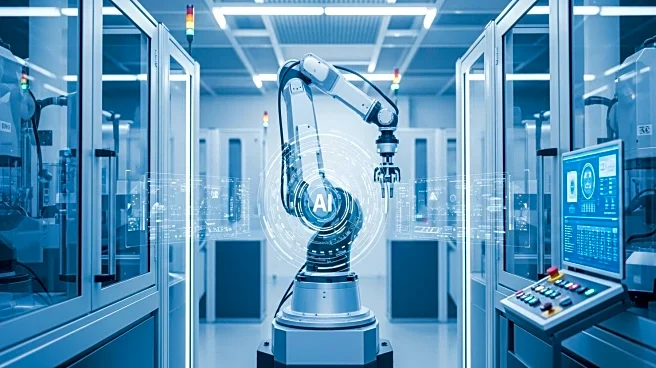What's Happening?
The UK manufacturing sector is increasingly leveraging artificial intelligence to enhance operations, reduce waste, and optimize energy use. However, many manufacturers remain stuck in pilot-mode, facing challenges such as misaligned strategies, fragmented data systems, and limited internal expertise. Despite these obstacles, success stories are emerging, with companies like Marks & Spencer using AI to significantly reduce warehouse accidents. The sector is urged to move beyond ambition to execution, embracing AI to meet evolving customer expectations and global competition.
Why It's Important?
AI adoption in manufacturing is crucial for maintaining competitiveness in a rapidly evolving global market. By integrating AI, manufacturers can streamline operations, reduce costs, and improve safety, ultimately leading to increased productivity and profitability. The transition from pilot projects to full-scale implementation is essential for realizing these benefits. Overcoming barriers to AI adoption will require coordinated efforts from government, industry, and technology providers, highlighting the need for strategic partnerships and investment in digital infrastructure.
What's Next?
Manufacturers must focus on building a skilled workforce and robust digital infrastructure to fully harness AI's potential. This includes investing in secure cloud-based platforms, IoT-enabled machinery, and upskilling initiatives. As AI adoption progresses, companies will need to adapt to changing job roles and embrace transformation, with technology partners playing a vital role in facilitating this transition. The future of manufacturing is intelligent and data-driven, and those who act now will be better positioned to capitalize on emerging opportunities.
Beyond the Headlines
The slow pace of AI adoption in manufacturing highlights broader issues such as regulatory complexity and data privacy concerns. Addressing these challenges will be crucial for fostering innovation and ensuring that AI technologies are implemented responsibly. Additionally, the emphasis on AI as 'Assistive Intelligence' underscores the importance of empowering people alongside machines, suggesting a shift towards more collaborative and human-centric approaches in the industry.










